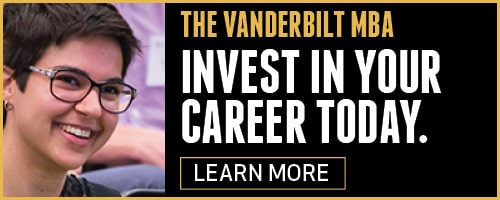By Heream Yang
For MBA students seeking to expose themselves to real-world problem solving across a vast range of industries, consulting is an exciting opportunity — and one of the most popular post-business school roles. In order to demystify the world of consulting, the Owen Strategy and Consulting Club invited alumni back to campus for the Consulting Symposium a few weeks ago.
The alumni — who hailed from Accenture, Bain and Company, Boston Consulting Group, Deloitte, Infosys, PwC, and West Monroe — shared their experiences and offered advice for aspiring consultants. Below are their top seven must-know tips for business school students hoping to break into consulting.
There truly is no typical day.
Consultants’ work varies greatly depending on the project they are working on, including the length: Projects may be as short as three weeks and as long as three years. According to Mike Foster (MBA’17), who works for Boston Consulting Group, shorter projects are typically more concerned with due diligence and risk minimization of proposed business deals. “It’s typically more intense,” he said. “There’s a little bit less client involvement because you just don’t have time to build that relationship. Longer engagements tend to be a little more client relationship heavy, so you become pretty embedded and you get to know people pretty well. It’s a different challenge. You do tend to get a little more work-life balance, because it’s longer and you build credibility.”
Clients also seek different kinds of solutions depending on the length of the case. “For short cases, they’re simply looking for a ‘yes or no’ answer to the question, whereas for the longer ones, it’s more open-ended, (such as) putting together a strategy or implementing a strategy,” said Phillip Hathorn (MBA‘18), a consultant at Bain & Company.
It’s all about strong client relationships.
Seeing clients succeed is often the most fulfilling part of a consultant’s job. “In consulting, you start getting into the mindset of, everything’s about the client and become obsessed with the client’s results. You are their counselor almost, and seeing them succeed is super, super exciting,” Hathorn said.
Strong client relationships are often developed through longer cases. “When you’re at a client for a long time, you become their friends. If you’re there for a year, all of a sudden, you’re a part of the business, and you get to see some fruits of your labor,” said Steve Puricelli (MBA ‘99), Managing Director at Accenture Strategy.
Joining a firm is about finding your fit.
Consulting ultimately boils down to one word: collaboration, both with clients and colleagues, and it’s extremely important that aspiring consultants join a firm of people they genuinely enjoy working with. “You spend a lot of time with your colleagues: sharing rental cars, dinner in airports, breakfast in hotels,” Puricelli said. “We all have different cultures at our firms, but we all do similar work. There’s no good culture, bad culture; it’s about finding a good fit.”
Saying no is essential to success.
It’s no secret that consulting is a demanding job that offers lots of opportunities on top of the standard workload. Thus, it’s absolutely essential that consultants learn to develop a healthy work-life balance in order to avoid beginner burnout. “There are endless opportunities, and you learn quickly how to strap yourself to some and say no to other ones,” said Jack Johnson, Senior Consultant at Infosys. “Saying no is critical to success and sanity.”
“There are endless opportunities, and you learn quickly how to strap yourself to some and say no to other ones” – Jack Johnson, Infosys
Social intelligence matters — a lot.
While consultants must be skilled at quantitative analysis, their ability to interact well with clients is what ultimately drives success. “The human side of things plays a bigger role than I thought it would, in terms of the politics of the organization, and what different executives want,” Hathorn said. “Trying to figure out what incentives are driving their behaviors and understanding how to communicate with them in order to get them on board with what you’re recommending — that human element is much more important than just doing an analysis that’s solid.”
The learning never stops.
Because consultants work with constantly evolving industries, it is crucial to stay up to date on best practices for their clients. Puricelli keeps informed through subscribing to email newsletters and activating Google Alerts for his clients’ industries. “We have all sorts of practice areas and networks and trainings and learning sessions so we can stay current,” Puricelli said. “The collaborative nature of Accenture is pretty strong, so everybody is constantly reaching out and trying to help each other.”
It might not be just a stop along the way, so keep an open mind.
While some consultants join a firm with the intention of leaving after a few years, that’s not always what happens. “I joined Accenture thinking I was going to be there three or four years and then I was going to be out,” Puricelli said. “I’ve been there 11 or 12, and I can see myself being there for much longer.”
“I enjoy it,” he added. “I have not found anything, not for a lack of looking around, that excites me as much, that stimulates my brain as much, as consulting does.”
Want to learn more about getting an MBA at Vanderbilt Business? Visit the program page or request more information.
